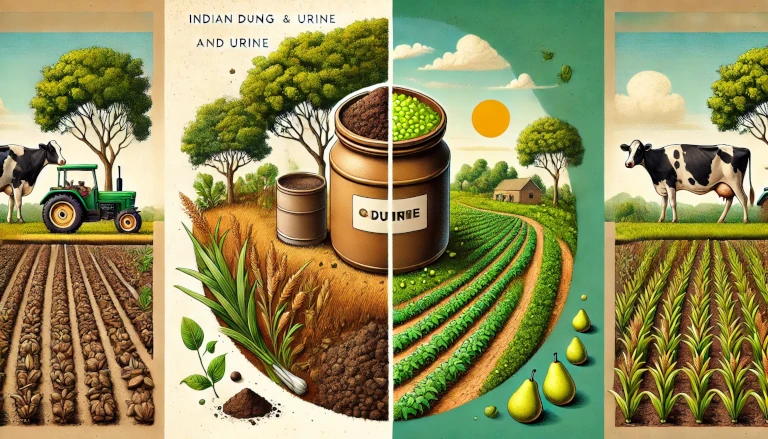Zero Budget Farming (ZBF), also known as Zero Budget Natural Farming (ZBNF), is an agricultural practice that minimizes the cost of farming by using natural resources and locally available materials. With a focus on sustainability and self-sufficiency, zero budget farming helps farmers cultivate crops without relying on chemical fertilizers and pesticides, reducing expenses and promoting environmental health.
In this blog post, we’ll explore what zero budget farming is, how it works, and why it’s an effective and eco-friendly alternative to conventional farming. Whether you’re a farmer looking to cut costs or an individual interested in sustainable agriculture, zero budget farming offers a viable solution that benefits both farmers and the environment.
What is Zero Budget Farming? 🌍🌾
Zero Budget Farming is an organic farming method where the cost of cultivation is minimized by using natural inputs. Instead of purchasing expensive chemical fertilizers and pesticides, farmers rely on bio-resources like cow dung, urine, and farm residues to nourish their crops. The goal is to achieve self-reliance in farming by using what’s readily available on the farm, making it a low-cost and sustainable approach.
Principles of Zero Budget Farming 🌱🧑🌾
Zero Budget Farming is based on four key principles that guide farmers in maintaining soil fertility and crop health without relying on synthetic inputs:
1. Jeevamrutha 🌾💧
Jeevamrutha is a natural fertilizer made from a mixture of cow dung, cow urine, jaggery, pulse flour, and water. This mixture is allowed to ferment and is then applied to the soil, enriching it with beneficial microorganisms and nutrients.
2. Bijamrita 🌱🌊
Bijamrita is a seed treatment prepared from cow dung, cow urine, and lime. It helps protect seeds from soil-borne diseases and pests, ensuring healthy germination and crop growth.
3. Mulching 🍃🌾
Mulching involves covering the soil with crop residues, leaves, or straw. This practice helps conserve soil moisture, regulate temperature, and prevent the growth of weeds, reducing the need for chemical herbicides.
4. Waaphasa (Soil Aeration) 🌬️🌿
Waaphasa emphasizes maintaining soil moisture and aeration. By reducing excessive irrigation and tilling, farmers can preserve the natural structure of the soil, improving its fertility and minimizing water use.
Benefits of Zero Budget Farming 🌍💚
Zero Budget Farming offers several benefits that contribute to sustainable agriculture:
1. Cost Reduction 💸
By eliminating the need for chemical fertilizers and pesticides, farmers can significantly reduce their farming expenses. Zero budget farming makes it easier for small-scale farmers to manage costs and increase profitability.
2. Improves Soil Health 🌱
The use of natural inputs like Jeevamrutha and Bijamrita enhances soil fertility and biodiversity. Over time, this practice can improve soil structure, increase water retention, and support the growth of healthy crops.
3. Supports Environmental Sustainability 🌍
Zero Budget Farming reduces the use of chemical inputs that can harm ecosystems and pollute water sources. By promoting organic farming techniques, it supports biodiversity and helps combat climate change.
4. Empowers Farmers 👩🌾👨🌾
Zero budget farming encourages farmers to become self-reliant by using local resources. This approach reduces their dependence on external suppliers and promotes traditional knowledge and farming practices.
How to Get Started with Zero Budget Farming 🌱👩🌾
If you’re interested in trying zero budget farming, here are some simple steps to get started:
1. Prepare Jeevamrutha 🌾💧
Collect cow dung, cow urine, jaggery, pulse flour, and water. Mix these ingredients and let them ferment for a few days. Use the mixture to fertilize your crops and improve soil health.
- Example: For one acre of land, mix 10 kg of cow dung, 10 liters of cow urine, 2 kg of jaggery, 2 kg of pulse flour, and 200 liters of water.
2. Treat Seeds with Bijamrita 🌱🌊
Before planting, treat your seeds with a mixture of cow dung, cow urine, and lime. This will protect them from pests and promote healthy growth.
- Example: Mix 5 kg of cow dung, 5 liters of cow urine, and a pinch of lime. Coat the seeds with the mixture and allow them to dry before planting.
3. Use Mulching for Soil Conservation 🍃🌾
Collect dry leaves, straw, or other plant residues and spread them over the soil. This layer helps retain moisture, suppress weeds, and enhance soil fertility.
4. Practice Soil Aeration (Waaphasa) 🌬️
Avoid over-irrigation and tilling. Focus on maintaining proper soil moisture levels to encourage aeration and microbial activity in the soil.
Real-Life Example: Zero Budget Farming Success in India 🇮🇳🌾
Zero Budget Natural Farming has seen success in states like Andhra Pradesh and Maharashtra, where farmers have adopted this method to reduce costs and improve crop yields. Farmers report better soil health, increased yields, and improved financial stability, thanks to the reduced reliance on costly chemical inputs.
Tips for Implementing Zero Budget Farming 📝🌾
- Start Small: Begin with a small plot to test zero budget farming techniques before expanding to larger areas.
- Attend Workshops: Look for local workshops or online courses on zero budget farming to learn more about the principles and practices.
- Join a Farming Community: Connect with other farmers who practice zero budget farming to share tips, experiences, and resources.
Embrace Zero Budget Farming for Sustainable Agriculture 🌱💚
Zero Budget Farming offers a sustainable and cost-effective way for farmers to grow healthy crops without chemical fertilizers and pesticides. By focusing on natural resources, traditional practices, and self-reliance, this method promotes a healthier environment and supports small-scale farmers. Whether you’re a new farmer or a seasoned professional, zero budget farming can provide a pathway to profitability and environmental stewardship.
Start exploring zero budget farming today and take a step toward a greener, more sustainable future in agriculture.
Discover more from Green Ecosystem - Renewable Energy, Agriculture, and Environmental Sustainability
Subscribe to get the latest posts sent to your email.


